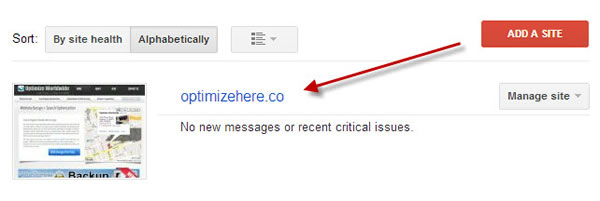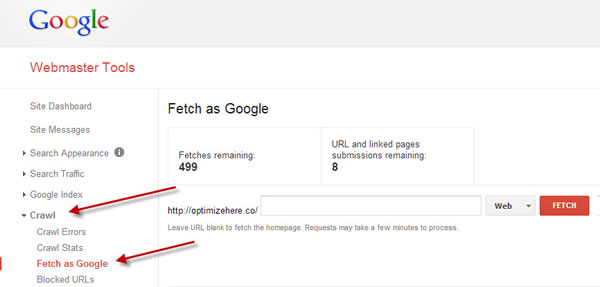Step 1: Visit Google Webmaster Tools
Note: If you haven’t verified your website with Google Webmaster Tools yet, see Seomaster-Aziz article Google Webmaster Tools: An Overview for step-by-step instructions.
From the Google Webmaster Tools home screen, select the domain name, expand the Crawl menu, and then click Fetch as Google menu link.


Step 2: Fetch as Google
Enter your webpage or blog URL into the input field, leaving off the domain name, and click the FETCH button.

Step 3: Submit to Index
First verify that the Fetch Status was successful. If Googlebot can successfully fetch your page, you can submit that page to the Google index. Just click the Submit to index button.

You can submit either the URL itself (limit of 500 URLs per week per Webmaster Tools account), or the URL and all pages linked from it (limit of 10 per month per Webmaster Tools account).
- URL: Select if your page is new or has been recently updated. Google doesn’t guarantee to index all submitted URLs.
- URL and all linked pages: Select if your site has changed significantly. Google will use this URL as a starting point in indexing your site content. Google doesn’t guarantee to index all pages on your site.

Help Google Understand That Your Website is the Originator of Your Content
Have you ever had other websites scrape your content and then outrank you? This can happen when websites pull your content in from your RSS feed and then get crawled by Googlebot sooner than your site. If another website has a more frequent crawl rate and/or a higher domain authority, they are likely to be considered the originator of your content.
Here is a related question Google’s Matt Cutts touches on in the video below:
“Google crawls site A every hour and site B once in a day. Site B writes an article, site A copies it changing time stamp. Site A gets crawled first by Googlebot. Whose content is original in Google’s eyes and rank highly? If it’s A, then how does that do justice to site B?”
Cutts offered a couple of suggestions in the video, but those are still too slow in my opinion. Utilizing the Fetch as Google tool can help you combat the scrapers who have been outranking you with your content.
Summary
Adding the Fetch as Google tool to your arsenal of marketing tricks will help put your new content in front of Google searchers much faster. Include this step on your checklist when creating content and make a habit of implementing it to get found sooner.
Every time you publish a web page and blog post, it should be Fetched right away. Then you can feel free to sit back and watch your desired search engine results quickly appear.







No comments:
Post a Comment